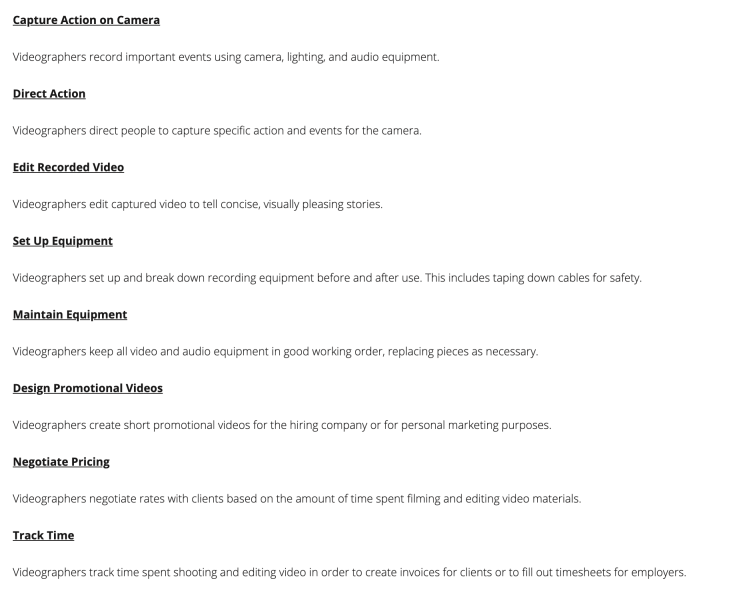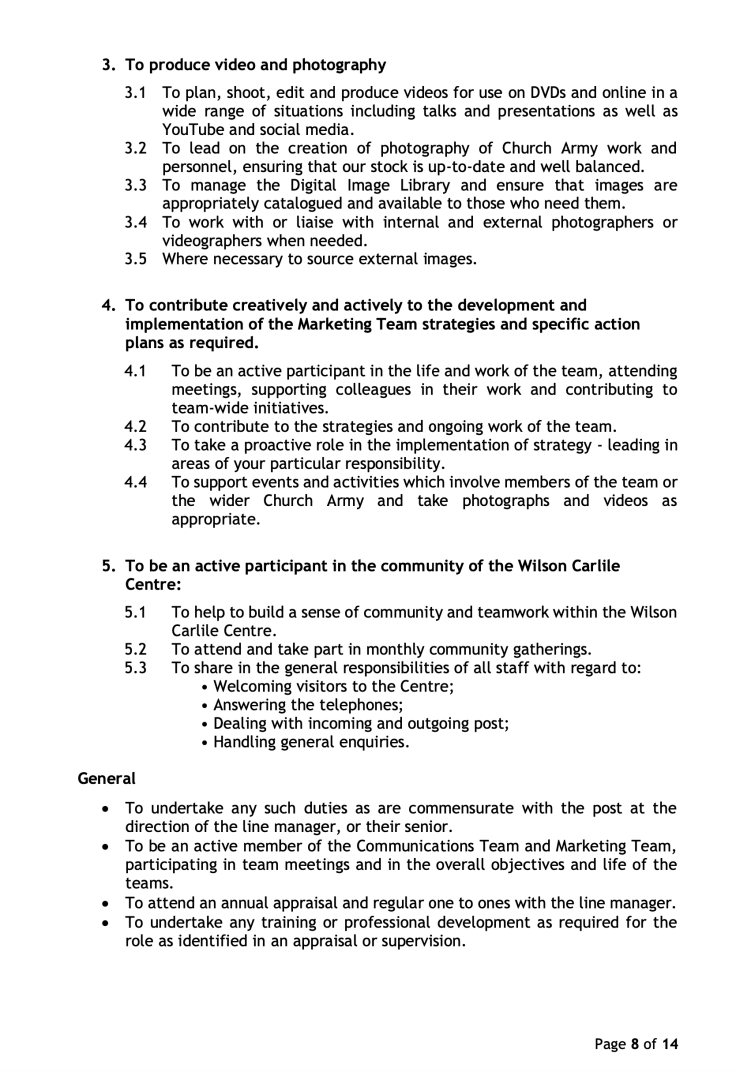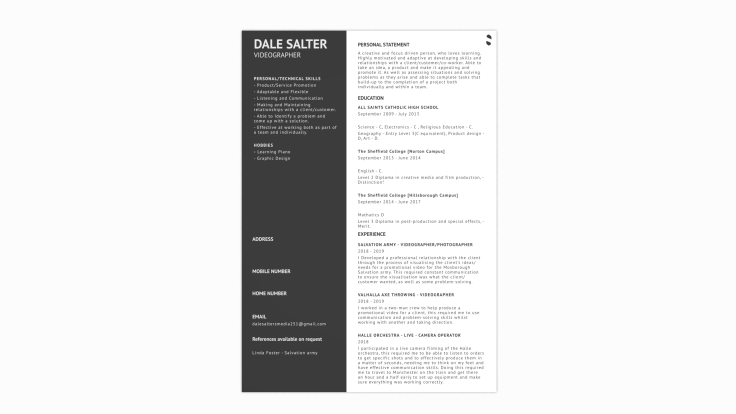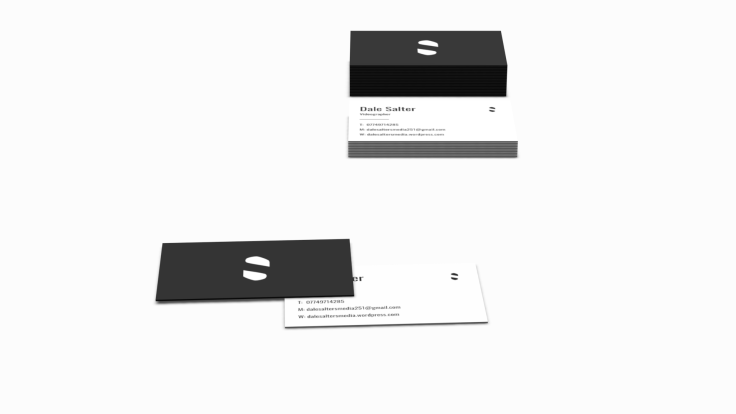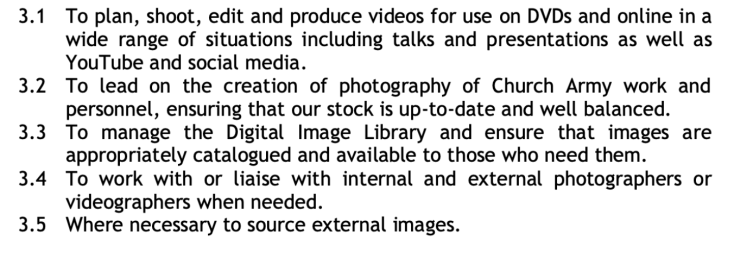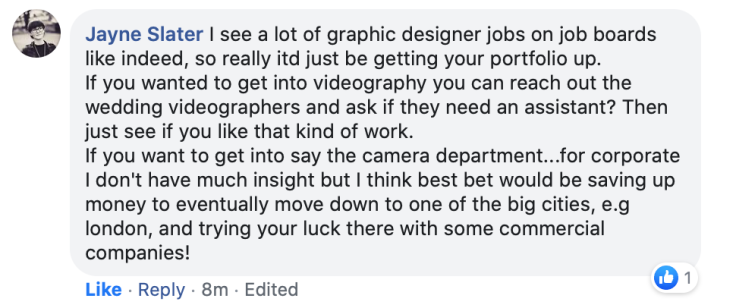Books
Bk1 – Bk = Book – 1 = Cinematography theory and practise image making for cinematographer and directors – second edition – Author = Blain Brown – the year of publication = 27 July 2011. – Example
Bk2 – Bk = Book – 2 = Shooting Digital video – DVCAM, Mini DV and DVCPRO – Jon Fauer, Asc.
Interviews
1 Q – A = Question 1 – Person = A – Carl Thompson – Example
1Q – B = Question 1 – Person = B – Jack Park – Example
1Q – C = Question 1 – Person = C – Lee Marsh – Example
BK1.1 – “So what are they? What are the conceptual tools of visual story-telling that we employ in all forms in all forms of visual storytelling? There are many, but we can roughly classify them into some general categories.”
Q1 – How did you get your first break/ where did you start off? Was there a specific root you took starting off?
- A – I started shooting weddings and corporate videos straight out of film school. I networked with as many people as possible and worked hard. I skipped the camera assistant route and after about 4 years working in the industry, I started marketing myself as a lighting camera operator/ dop. I’ve now worked with some of the biggest brands in the world including New Balance, Dreamworks, Manchester Utd, BBC, ITV etc.
- B – I was a production assistant on the film Dark River. I used this experience to get a training day with Leeds United TV, as a broadcast camera operator. Afterwards, I got hired, along with 6 university students who applied through their uni.
- C – I started as a trainee camera operator at Televideo Outside broadcast which is a company based in Sheffield.
Q2 – Do you have any qualifications in media studies/film and did it assist you in getting into being a camera operator?
- A – I have a BSc in Film Production Technology from Staffordshire University. My university experience gave me time to grow up and figure out what I wanted to do in life. The fact that I only did one exam in 4 years and made films every week was a bonus. The experience I gained at university put me on the right track but it was the work after university that got me to where I am now.
- B – I have a Level 3 Extended Diploma in Film and TV production (Distinction Distinction Merrit) from Leeds City College, but I got both jobs mentioned above in the summer in between the two years, so the qualification didn’t help with those. But with my fulltime employment, it was very important.
- C – I have a degree in Film and Media Production, I believe a degree shows an ability to learn to a high level, but I know plenty of camera operators who have started through other means and hard work has set them apart from more qualified candidates.
Q3 – In your opinion what are the most essential skills required as a camera operator?
- A – Being any form of a film-maker is essentially professional problem-solving. The ability to remain calm, think clearly and work hard at all times is what will help you become successful. The technical skills are important but can realistically be learned online or picked up by shadowing people and asking questions.
- B – In live broadcasting, time management is the most important skill to have. In a day you have a lot of tasks, and it’s very easy to make mistakes. It’s not really a skill, but stamina is also important.
- C – Operating a camera is actually only a small part of being a camera operator. A strong work ethic with the initiative is key to becoming a valuable member of any film or TV crew, this shows you can be trusted with responsibilities as well as being someone who doesn’t constantly need to be told what to do. On the operating side, it is always good to listen to what the director requires from the shot/shots in order to put together a visually proficient broadcast. An eye for good composition helps but each director has a different style which means adaptability in a short period of time is always handy.
Q4 – Are there any interesting opportunities in the role and or industry, Can a camera operator lead to any other job roles?
- A – I absolutely love what I do. I get to hang out with cool people, filming in crazy locations and travel all over the world. Camera operating can open doors to meet people and ultimately lead to producing/ directing your own projects. There are tons of directors out there that started in the camera department. Typically they’re the ‘prettiest’ films.
- B – Camera operating leads to videographer jobs and a knowledge of editing makes a camera op even more desirable. Basically, any business person who wants a video or videos done can employ you. Charity events want videographers to make promotional videos, but they’re unpaid, of course. Those are the developments I’ve seen.
- C – As I currently work as a staff camera operator as opposed to freelancing it means I have access to colleagues who work across all aspects of outside broadcasting, this gives me an overall greater appreciation for the effort and skills required for each department and thus could allow me to train in other areas of I so wished. Generally, a camera operator will find themselves moving into other areas of camera work e.g crane, Steadicam, drones.
Q5 – What kind of hours do you expect to work on average?
-
- A – I typically charge for a 10 hour day but that can extend to 12-14 hours sometimes. That’s not sustainable every day as you’d burn out so I ensure I take time off to catch up on paperwork etc. I can work up to 80 hours a week but I’d typically say it’s 40-50hrs. Certainly more than your average 9-5pm. You have to remember that doing your accounts, social media, emailing is all considered work for a camera operator but doesn’t pay the bills in the short term. It still has to be done right though.
- B – My full-time Videographer and Editor position is a 9-5 Job, with long nights to finish important projects. At Leeds, the hours are sporadic, sometimes I work 14 hour days, sometimes I work 3 hours cause they only need me for something specific.
- C – Notoriously the TV industry, specifically live television broadcasts has a certain expectation to work very long days, this will include travelling to and from a job as well as the job itself. The idea is to make the outside broadcast work as soon as possible to make sure any errors or faults can be found and corrected sooner rather than later. As a freelancer, you have slightly more control over the hours that you undertake but it should still be accepted that these will come under the title of ‘unsociable hours’. It is hard to put a specific number on the hours you can expect to do, but it is definitely not a 9-5 and that shouldn’t be underestimated.
-
- Q6 – How much would you expect to earn an hour as a camera operator? / Are there any extra costs that need to be considered in this role?
-
- A – I charge a day rate plus equipment. It typically starts at around £500 per day and goes up from there. TV commercials and live events are high pressure and therefore you can charge more. I turn up with >£30,000 worth of equipment which I use every day and people find value in that. You have to factor in insurances, car, petrol, food expenses, laptops, physios (for the bad back you’ll inevitably get if you don’t train). New technology is being developed constantly so you have to keep up to date with your kit too.
-
- B – As far as senior operators go, that’s on the internet. LUTV or similar live streamers or broadcasters pay day to day. The amount is very dependent on who you’re with. Additional costs wise, being a football camera op means travelling to away games at different stadiums around the country, and that could get expensive if they ask you to drive yourself, which they don’t usually.
-
- C – Again this is a double-edged question. As a staff operator, it can vary depending on experience and length of service. Generally speaking, a staff operator will earn less than a freelance operator who will invoice a price for his skills which is set against union set prices, although each operator may negotiate with companies directly depending on the circumstances. BECTU has set out the prices that TV staff should charge depending on the job and length of day, this usually starts at £300 per day and will increase accordingly. As a staff operator, the daily earning will be considerably less but a guaranteed wage, training, employee perks and travel expenses are all covered. Working as a freelancer you would expect to cover hotel costs as well as travel expenses and food expenses. Also depending on the area of camera operating a client might require you to provide your own kit which will obviously come at a price.
-
- Q7 – Is there any specific specialist equipment needed / to have an intensive Knowlege of?
-
- A – Know your kit inside out. Anything after that can be learned on the job or online.
-
- B – A great understanding of DSLRs is very important, especially if you’re with a smaller company who pick their equipment sparingly. Have a basic knowledge of sound recording as well, because that’s something an amateur employer might forget. You don’t need a great knowledge of broadcasting rules, technicals and regulations unless you’re wanting to be a video journalist or a broadcast director.
-
- C – Speaking from my own experience I can say I had little knowledge of TV cameras. I happened to learn a lot from operators I worked with and then gradually from the experience I gained. I would say from some who works in live sports broadcast that a basic knowledge of sports coverage was more useful to me than the knowledge of the equipment because within the right environment you can gain the knowledge of the equipment over time. As I have mentioned if you are hardworking and willing then people will invest the time in your development.
-
- Q8 – How do you continue to get work, How beneficial is networking / getting a reputation?
-
- A – Networking is essential. The majority of my work is now through referrals or previous contacts so I don’t have to hunt for new work much. Having a good social media presence and an up to date website are all crucial.
-
- B – Apply to any job which matches your skill set. Be happy and willing to move for work. Networking is good, but don’t expect people to hand you work just because they like you. Showcase your videos and experience to employers, and proving you’re the most dependable camera op keeps you employed. Don’t only aim for larger media companies. Smaller companies focused on other industries need media specialists, and there where you’ll have the opportunity to make creative decisions and recommend equipment and video styles.
- C – I work as staff which means I don’t have to go looking for work. But from a staff perspective, it is imperative to conduct yourself as if you were looking for work, as the people you are working with could well be people who are recommending you in the future. So over the 4 years, I have been staff I have worked with multiple camera operators and broadcast crew and it is crucial that they see you as a punctual, organised, hard-working operator who they can rely on. Camera skill can be learnt but a bad attitude leaves a longer lasting impression on potential clients or employers.
- Q9 – Is it more likely that work is going to be freelance than permanent contract and would you say being a camera operator is competitive?
- A – Depending on the scale of the job you’re going for. Bigger projects such as TV commercials, live events and dramas all use freelancers. Smaller ad agencies may employ a ‘videographer’ which is essentially someone with a DSLR and will be on a permanent contract. Being a camera operator is competitive but I would suggest networking with like-minded people in your field. I get more work from other camera operators referring to me than anything else. Obviously, it works both ways and I send work back to others when I can.
- B – From my experience, contract work keeps you working in the industry more consistently so you can practice your profession for longer. Freelance web ads and event coverage keeps it interesting but is too spotty to support yourself when you’re just leaving education or starting out by other means. It’s very competitive, so grab at every opportunity to build your portfolio, even within the business you’re employed by.
- C – Being a camera operator is incredibly competitive, no doubt. From my experience, I would always recommend starting as a staff operator, to begin with, because there is an environment to learn and progress in a more protected environment. You also have access to a wider aspect of film/television production which ultimately will make you a more conscientious Camera operator overall. The general path seems to be that freelancing is the ultimate goal as this gives a greater earning potential as well as more control over your own workflow. However, the experience I have gained whilst working for a company would not have happened if I had started freelance.
- Q10 – Are there any significant changes in the media industry or you suspect there will be such as processing technology that has/will lead to less or more work? How do you think it has affected the role?
- A – Technology is constantly evolving and it’s key to not get left behind. I don’t think it’ll affect the amount of work out there. The amount of video/ film that is being produced and consumed is incredible so there’s plenty for everyone. Always remember, technology can’t be creativity.
- B – There’s an oversaturation of media content, and everyone knows it. This leads to more and more industries outside of media jumping to media to promote them all over daytime TV and social media. I (try and) stay separate from social media trends and video styles, primarily because a lot of it is too dense to penetrate and it’s a shot in the dark to attempt it. Equipment wise, I do stay up to date with it and support the idea of making video, film and TV equipment more efficient. In the short term, modern media times is leading to more work, with more equipment development creating more roles to fill at companies, big or small. In the long term, like everything, media has an over-saturation point where smaller company’s social media presences won’t be able to break through the wall, and they may try to promote themselves by other means. It’ll be interesting to see what they come up with.
- C – I think the television industry is not too dissimilar any other industry where companies will try to push technology with an eye on keeping costs down. This has seen development over remote-controlled camera operation that maybe requires fewer operators on site or operators who can work multiple jobs in one day working from a master control room. However there is no substitute for the creative eye of a good operator and the reactions required for live television, so whilst jobs may become easier and more convenient I believe that the role of the operator is secure for the foreseeable future.
Qu1 – 2 = Question 1 – Person = 2 – Jack Park
Qu1 – 3 = Question 1 – Person = 3 – Lee Marsh














